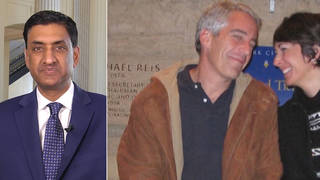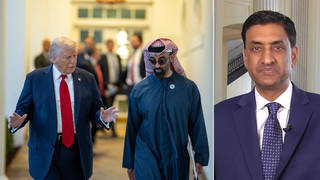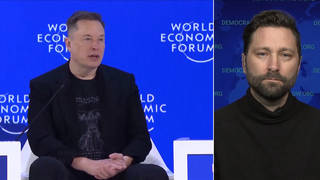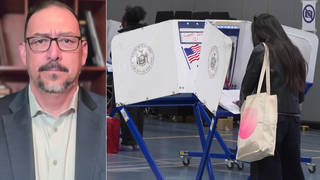
Guests
- Peter Beinarteditor-at-large at Jewish Currents and a professor at the Newmark School of Journalism at the City University of New York.
We speak to Peter Beinart, editor-at-large at Jewish Currents, about changing popular opinion in the U.S. toward Israel and Palestine. “I’m not sure there’s any political issue in the United States, perhaps other than gay marriage, over the last couple of decades where public opinion has shifted as fast,” he says, citing the surprise victory of pro-Palestinian mayoral candidate Zohran Mamdani in New York City’s Democratic primary as evidence of a shifting political landscape. We also discuss a recent article in The New York Times that criticizes Mamdani, a Ugandan-born Indian Muslim who immigrated to the U.S. as a child, for self-identifying as both Asian and Black/African American on a college application. Beinart, whose own parents are of European Jewish background and were raised in multiracial South Africa, explains how the limitations of formal racial categories often elide the true complexity of racial, ethnic and national identity. “It’s not the case that Zohran Mamdani was trying to pull some sleight of hand to try to take advantage of affirmative action. This was a very deep statement about what he believed it was to have grown up in Uganda,” he says.
Transcript
AMY GOODMAN: Peter, you did a guest essay for The New York Times, its headline, “Democrats Need to Understand That Opinions on Israel Are Changing Fast.” And the image that accompanies the essay is a photograph of Zohran Mamdani, the Democratic candidate for mayor of New York. If elected, he would be the first South Asian and Muslim mayor of New York City. He calls himself a Democratic Socialist, was a former state assemblyman. I want to ask you about Zohran Mamdani, and particularly coverage in The New York Times. We’ll get to that coverage in a minute, who — they wrote a piece against him, when they said they weren’t going to endorse anyone in the Democratic primary, and then have written another piece. But I first want to talk about the significance of his win and how it is tied to that changing opinion on Israel around the country, why it’s, you know, sent shockwaves through the Democratic Party throughout the United States.
PETER BEINART: Right. I think one of the reasons people thought Mamdani couldn’t win was they had a set of assumptions about what was politically possible on the question of Israel-Palestine that are just really out of date if you look at public opinion. I’m not sure there’s any political issue in the United States, perhaps other than gay marriage, over the last couple of decades where public opinion has shifted as fast as it is shifting on Israel-Palestine. Just to give an example, in 2013, Democrats favored Israel over the Palestinians by 36 points. Today they favor the Palestinians over Israel by 38 points. Even young Republicans, even Republicans under the age of 50, now a majority of them have a negative view of Israel.
So, what Mamdani is doing is revealing a dramatic shift that’s taking place, being led by young people, but not only among young people. It’s happening in New York and across the country. What I was suggesting in the Times is, Democrats running for president in 2028 should look at what has happened with Mamdani, because he has revealed that the politics on Israel, in the Democratic Party and beyond, have radically shifted in terms of public opinion.
AMY GOODMAN: And let me ask you about the Times’ coverage and what exactly they are doing. I wanted to go to a piece that Margaret Sullivan wrote. She used to be the public editor of The New York Times. It’s been widely criticized, the Times, because it has relied on widespread information that was hacked on Columbia University databases. The information reached The New York Times through an intermediary who the Times didn’t identify, but it was later revealed to be Jordan Lasker, a well-known eugenicist and criticized white supremacist. The former public editor of the Times, who I was talking about, known as the ombudsman, Margaret Sullivan, called the decision to publish the piece based on stolen information “unwise,” and that it fell far short of the newsworthiness bar. During the primary, the paper officially doesn’t make endorsements. They published an editorial urging voters not to even rank Mamdani in New York’s ranked-choice voting system.
Sullivan writes, quote, “The incident raises a larger issue: the Times's apparent opposition to Mamdani's candidacy.” She writes, quote, “The opinion side of the Times is entitled to its opinion, however misguided. But straight news articles, by contrast, aren’t supposed to go to bat for or against candidates. … With this made-up scandal, combined with the pre-election editorial, the Times looks like it’s on a crusade against Mamdani.” And she was also referring to the fact that the documents that were gotten from a Columbia database show that when Zohran Mamdani applied as an 18-year-old to college — he applied to Columbia; he wasn’t accepted — but he checked the box “African American,” among others, also “South Asian,” and, under it, wrote “Ugandan,” where he was born, where his family, his father’s family, had lived for a hundred years.
PETER BEINART: Yeah, I mean, I think one of the things that’s really important to understand about Zohran Mamdani and about his father, who’s a very, very distinguished political scientist, Mahmood Mamdani, is that their identity was as Africans — right? — and that the vision they had of Uganda was of a country that was multiracial, an African country that was multiracial, that included people like their families, who came from South Asia, and people who were Black. In fact, in some ways, this was the struggle against Idi Amin. I mean, not to get into the weeds here, but Idi Amin had expelled Asians from Uganda precisely because of his racist view that South Asians were not truly Africans. And so, for Zohran Mamdani, it was an important statement to say, “I am an African.” And this is actually important — my family are South Africans, right? Obviously, Jew —
AMY GOODMAN: Your family, Peter.
PETER BEINART: My family are South Africans, Jews who came to South Africa. But it was very important for many of those Jews to say that we are also part of this country. And I think when you see what the — when you understand it in that context, it’s not the case that Zohran Mamdani was trying to pull some sleight of hand to try to take advantage of affirmative action. This was a very deep statement about what he believed it was to have grown up in Uganda. And I think that’s what’s perhaps not really understood about the context of this story.
JUAN GONZÁLEZ: Peter, going back to this, the race for mayor in New York, there are news reports now that the financial elite of New York are trying to convince all other candidates to eventually drop out behind one, whether that’s Cuomo or Eric Adams, and even convincing Curtis Sliwa, the Republican, to drop out. They’re trying to make a pact to all unite against Mamdani. I can’t remember anything like that happening. You’d have to go back to 1950, when Vito Marcantonio was the East Harlem congressman, and the Democratic, the Republican Party, the Liberal Party, all united behind one candidate to defeat Marcantonio, who was the American Labor Party candidate and a socialist. Wondering your thoughts about this incredible attempt at an unholy alliance.
PETER BEINART: Well, in many ways, it kind of illustrates Mamdani’s whole point — right? — which is that this is a city that is not working, that is really unaffordable for so many working-class New Yorkers, but it’s a city that in some ways is politically only working and in so many ways controlled by people who have vast amounts of wealth. And, you know, if people have vast amounts of wealth, fine, but they should think about the people who live in their city who don’t live in multi-multimillion-dollar apartments and go off to houses in the Hamptons, and have a little bit of empathy and concern for the fact that there are so many New Yorkers who would really benefit from having free buses or not having to pay so much for rent. Like, have some human concern and empathy. These people don’t care at all about that. All they care about is making sure that they don’t have to pay a little bit more in taxes, even though they would not even notice it, given the scale of their wealth.
And they’re threatened by Zohran Mamdani’s support for the idea of equality between Israeli Jews and Palestinians, right? It’s extraordinary that they would be so afraid and so angry at a man who is simply talking about the basic idea that Israeli Jews and Palestinians deserve to be treated equally, which I thought was the principle that we were supposed to believe in in the United States.
AMY GOODMAN: I want to thank you so much, Peter, for joining us. Peter Beinart, editor-at-large at Jewish Currents, his most recent book is Being Jewish After the Destruction of Gaza. He’s also a professor at the Newmark School of Journalism at the City University of New York. And we’ll link to your opinion piece in The New York Times, “Democrats Need to Understand That Opinions on Israel Are Changing Fast.”
Next up, we speak with professor John Bellamy Foster on “The Trump Doctrine and the New MAGA Imperialism.” Back in 20 seconds.
[break]
AMY GOODMAN: Michael Franit in our Democracy Now! studios a decade ago.












Media Options